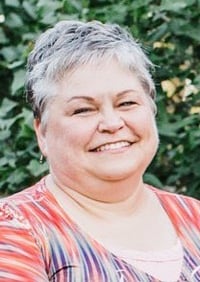Pediatrix® Medical Group is a clinician-led company, and nurses fill a variety of key roles — at the bedside, in our practices and throughout our operations. We spoke with a few of the nurses at Pediatrix about their career paths, what nursing has taught them and how they apply that knowledge to their current roles.
Maria Wang, R.N., BSN
Diabetes Educator

Why did you become a nurse?
I grew up with asthma, so I was always around health care providers. I initially thought I wanted to be a doctor, but as I volunteered and got older, the nursing role aligned more with my goal of being a community leader.
I grew up in Yakima, Washington, with a large migrant and Hispanic population. Seeing nurses tackle health disparities and work with the migrant population is amazing. I love that in my current role, I can connect with my patients to help alleviate health disparities. My whole life, I have thought of nurses as patient and compassionate, and I hope I am caring for my patients the way my nurses did for me.
What is your specialty?
I specialize in maternal-fetal medicine, working with expecting mothers with high-risk pregnancies due to complications such as diabetes, high blood pressure or thyroid issues.
When did you transition to a non-bedside role?
About a year ago when I moved from Seattle, Washington, to Virginia.
What drew you to a career at Pediatrix?
My career started as a pediatric-neonatal nurse working in the NICU at Providence, followed by the COVID-19 step-down and medical unit at Seattle Children’s Hospital. I have always loved working with families and participating in patient education, so when I learned about the diabetes educator role, I was overjoyed. I have always wanted to be in an educator role, and although I no longer work directly with children/neonates, I still feel that I am assisting the family as a whole.
How does Pediatrix support nurses?
Pediatrix does an amazing job supporting nurses. They show they care with fair wages, supportive staff and quick resolution of problems, such as IT or workflow concerns. I can do well at my job because of all the support my manager at Pediatrix has given me.
How would you describe your current role?
I work directly with women to help them keep their blood sugar levels in a healthy range for their babies. Together, we work on modifying diet or medication when needed. As our office works with high-risk pregnancies, I may also assist women with additional problems, such as high blood pressure or thyroid issues. I work collaboratively with the doctor by suggesting changes to ensure the health of our patients and promote safe deliveries.
How does your education and experience as a nurse impact your current role? How does your clinical background inform your work?
I’m very thankful to have started my nursing career in the emergency department, and as a nursing assistant, I have learned how to adapt to changing situations quickly. This has been crucial to my career, as patients have different needs and standards of care. In my past roles, I have improved triage skills, incorporating family-centered care, time management and prioritization. In addition, my clinical background informs my work by giving me a foundation for creating strong interpersonal relationships with patients so they feel empowered and knowledgeable about making health care decisions.
Is there anything else you’d like to mention about your career or role?
I want to thank my coworkers and fellow diabetes educators Virginia, Trisha, Jennifer and Samantha. They have been nothing but supportive and helpful in my transition to my Pediatrix role. I am glad to have them as my coworkers; they all are excellent examples of what it means to go above and beyond for patients.
Nydia Altamirano, MPH, R.N., CPC
Vice President of Clinical Systems and Platform Operations

Why did you become a nurse?
I felt a vocation to serve others, to help people when they are going through major moments of fear, uncertainty and pain. To empower others with knowledge is to help them and improve patient outcomes for individuals and entire patient populations. I was inspired by the words of Ralph Waldo Emerson, “To know even one life has breathed easier because you have lived. This is to have succeeded,” and Mother Teresa: “If you cannot feed a hundred men, feed one.”
What is your specialty?
My specialty is obstetrics and gynecology, and I practiced as a labor and delivery nurse.
When did you transition to a non-bedside role?
About 20 years ago. I first worked in managed care, helping create disease management programs to decrease morbidity and mortality in at-risk patient populations and then specialized in clinical informatics.
What drew you to a career at Pediatrix?
I was attracted by the mission of taking care of women and children with severe conditions and using the power of technology to transform the patient and clinician experience.
How would you describe your current role?
I lead the design, development, implementation and optimization of all Pediatrix clinical systems, products and technologies to enhance population health outcomes, improve the patient and clinician experience and strengthen organizational performance. I partner with our executive leadership, specialty medical officers, IT teams and multidisciplinary stakeholders across the organization to deliver efficient, cost-effective and adaptable technology products to improve the patient journey and overall health care experience while facilitating technology adoption, re-engineering and clinical practice transformation.
How does Pediatrix support nurses?
We are always supported in being part of the teams that deliver amazing care to our critically ill patients. It is a team effort, and nurses are valued as part of that team. We are also afforded a wealth of diverse roles in which we can contribute as nurses to “take great care of the patient, every day and in every way.”TM
How does your education and experience as a nurse impact your current role? How does your clinical background inform your work?
My experience encompasses diverse areas of the health care industry, including clinical informatics, managed care and public and population health management. I graduated from Florida International University with degrees in nursing and public health. My work has included designing and managing systems to document and report population health metrics and partnering with regulatory agencies and payer partners to drive improved health outcomes and reduce utilization costs.
As a clinician and clinical informaticist, I am passionate about the vital marriage of clinical strategy insight and expertise in digital technology and systems. Fueling my passion are interoperability/connecting health care, leveraging data to eliminate health disparities and delivering technology solutions to reduce clinician burnout and return joy to the clinician experience. Emerging technologies that are transforming care and shifting the health care paradigm continue to drive my excitement in being a member of Pediatrix and the health technology industry.
Ivan Munro, BSN, R.N.
Training and Development Specialist

Why did you become a nurse?
My pathway to nursehood was accidental, or some might say by fate. During my freshman year of college, biology was my major, and I was in the main building of the University of Miami’s School of Nursing. While waiting for a friend in the nursing program, I was approached by a counselor who questioned my major and asked permission to view my grades. I agreed, and after review, the counselor asked if I was interested in joining the nursing and health studies program. After some convincing on the counselor’s end, I enrolled in the program.
What is your specialty?
Upon graduating, I chose to be a float nurse. My choice of departments was psychiatric and oncology.
When did you transition to a non-bedside role?
Two years after graduation, I received an offer to work in a non-bedside role with a major pharmaceutical outpatient services company.
What drew you to a career at Pediatrix?
I was contacted by a previous supervisor who worked for Pediatrix and was persuaded to seek new employment opportunities.
How does Pediatrix support nurses?
Pediatrix provides nurses with guiding principles, such as our mission, vision and values, to help us function together as a team and work toward a common business goal. We are empowered to share our ideas in an environment of inclusivity and belonging.
How would you describe your current role?
My role is to train individuals by creating meaningful experiences and developing their skill sets through a variety of educational topics and programs.
How does your education and experience as a nurse impact your current role? How does your clinical background inform your work?
As nurses, we act as educators nonstop to our patients. They rely on us to provide the necessary means to facilitate and foster their well-being in and out of the work setting.
Is there anything else you’d like to mention about your career or role?
I love how Pediatrix gives nurses equal opportunities to explore roles outside the norm. By providing us with alternatives, nurses are no longer limited to the same duties and responsibilities we once were.
Vicki Leamy, NNP
Vice President, Advanced Practice Provider Program

Why did you become a nurse?
I was a respiratory therapist (RT) before starting my nursing career. I worked in the NICU as an RT, but I also floated to other units in the hospital. I wanted to work in NICU full-time and have a larger role. I thought becoming an R.N. was the best path to achieving that goal.
What is your specialty?
My entire clinical nursing and nurse practitioner career has been in neonatology.
When did you transition to a non-bedside role?
It was a slow transition. In 2007, I stepped into the central regional manager position for the advanced practice department at Pediatrix. It was a hybrid position, with 50% of my time spent in the clinical setting as a neonatal nurse practitioner (NNP) and 50% in an administrative setting.
As my leadership role in the advanced practice department became more demanding, the percentage of time dedicated to the administrative portion of the role increased while the clinical portion decreased. Although it was a very difficult decision, I stepped away from my clinical responsibilities in 2019.
What drew you to a career at Pediatrix?
My husband and I grew up in a small town near Roanoke, Virginia. We’d been away for many years while he was in the Army and wanted to go home. I applied for a position with Pediatrix in 2004 because the NICU in Roanoke was a Pediatrix practice. It was truly a decision based on location, but once I began working for Pediatrix, I really appreciated the company and practice culture.
How does Pediatrix support nurses?
Advanced practice registered nurses (APRNs) are integral to our practices and Pediatrix. As such, Pediatrix provides a foundation designed to enable APRNs to focus on clinical excellence and provide the highest quality of care to our patients.
How would you describe your current role?
Our department is the subject-matter expert on advanced practice. We provide leadership and guidance to our advanced practice providers, operational support, strategic direction, advocacy and subject-matter expertise on topics related to advanced practice.
How does your education and experience as a nurse impact your current role? How does your clinical background inform your work?
My nursing and advanced practice nursing background is an essential element of my current position. Many of the questions that arise require that I draw from my experience as an NNP or an R.N. to guide direction.
Before joining Pediatrix, I worked in various environments: a large, private neonatology practice, a large hospital system, a university-owned practice and a single hospital that didn’t belong to a larger system. These varied settings offered very different employment experiences, but all shaped my current knowledge base.
DeeAnn Tak, R.N.
Certified Diabetes Care and Education Specialist

Why did you become a nurse?
I became a nurse over 20 years ago to support my family after my husband was disabled by multiple sclerosis. I had been a stay-at-home mom until that time, and it was a rough transition to nursing school and being away from home. But, with a lot of wonderful people around us taking care of my husband and children, I was able to complete my BSN.
What is your specialty?
I knew that I wanted to work in women's health, but I took an indirect route to get there. I started at a small community hospital in Rexburg, Idaho, working a 10 a.m. to 10 p.m. shift in its small intensive care unit (ICU). I had wonderful nurses there who took me under their wings and taught this rookie the ropes. When the ICU didn’t have patients, I floated around the hospital, working shifts in the emergency department, orthopedics, medical-surgical and labor and delivery (L&D). It was a wonderful experience for a new nurse.
I loved L&D and the postpartum unit and was often asked to take care of the postpartum patients who overflowed onto our medical-surgical floor. I welcomed the chance to take care of moms and babies. This, eventually, led to my career of 15 years as a labor and delivery and neonatal ICU nurse in four hospitals in our area.
When did you transition to a non-bedside role? What drew you to a career at Pediatrix?
About five years ago, I transitioned to working for Pediatrix as the R.N. patient coordinator at our Idaho Falls, Idaho, maternal-fetal medicine (MFM) office. I was drawn to working in the Pediatrix office because of the quality of care and the people who work in this office. The front office, sonographers and physicians were friendly and professional. I was eventually able to go full-time at Pediatrix and expanded my role to include being a certified diabetes care and education specialist.
How would you describe your current role?
In my current role, I provide coordination of care for patients in a large rural area that includes Idaho, Wyoming and Montana. Many of our patients need to travel to Utah or other states for care for pregnancy complications, so I coordinate patient care to and from our office to providers in other states when needed. I also educate and help moms manage their type 1, type 2 and gestational diabetes. We provide weekly reviews of each patient with diabetes and work with them to get the best glucose control during their pregnancy.
How does Pediatrix support nurses?
Pediatrix supports nurses by helping them give the best care possible as part of a team of educated and qualified individuals. The company recognizes everyone's value as a collaborative team member. Completing certifications, continuing education and collaboration help us all be better providers for our patients.
How does your education and experience as a nurse impact your current role? How does your clinical background inform your work?
My past experience in L&D and NICU helps me every day. Understanding pregnancy and the care provided in L&D and in the NICU helps me answer patients’ questions, help them process their diagnoses and assist the physicians as they provide needed care. I have learned so much in this practice about the many complications that can arise during pregnancy.
I have also learned that even though many complications can’t be prevented, I can help women experiencing diabetes during pregnancy feel empowered to help themselves and the child they are carrying. Through good nutrition, physical activity and support, we can help these women and their future babies be healthier and lower the risk of complications.
I may not be delivering babies anymore, but I can still support women and children and help improve many lives through the care I help provide in our MFM Practice. Same purpose, just a different angle.
